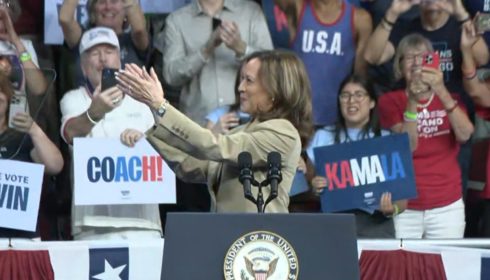During a campaign rally in Glendale, Arizona, Democratic presidential candidate Kamala Harris was met with chants of “Free, free Palestine” as she addressed a crowd of approximately 15,000 supporters. The demonstration, which interrupted her speech, highlighted the growing pressure within her party to advocate for a ceasefire in the ongoing conflict between Israel and Hamas in Gaza. Harris, acknowledging the protesters, reiterated her stance on the necessity of a ceasefire, stating, “I have been clear: now is the time to get a ceasefire deal and get the hostage deal done.”
Kamala Harris’s comments reflect the complex position she finds herself in as she navigates the demands of her party’s progressive wing while maintaining broader appeal. The Biden administration, of which she is a part, has expressed support for Israel, continuing military aid despite calls for a ceasefire. Harris’s remarks in Arizona underline her efforts to bridge these differing perspectives, emphasizing her commitment to ending the conflict while also acknowledging the administration’s ongoing support for Israel.
Balancing Act: Addressing the Party’s Progressive Wing
The incident in Arizona is not an isolated one. Just days earlier, Harris faced similar protests in Michigan, where she was heckled by pro-Palestine demonstrators during a campaign event. The protesters accused her of supporting “genocide,” chanting, “Kamala, Kamala, you can’t hide, we won’t vote for genocide.” Harris’s response was direct, asserting that the focus should be on defeating Donald Trump rather than dividing the Democratic Party. However, the exchange highlighted the challenges Harris faces in addressing the concerns of her party’s base without alienating the broader electorate.
Critics of Harris argue that her responses have sometimes appeared dismissive, particularly in situations where young protesters have raised concerns about the administration’s policies on Israel. The viral video from the Michigan rally has fueled these criticisms, with some questioning Harris’s ability to effectively engage with the progressive wing of the Democratic Party. Despite this, Harris remains focused on her campaign, striving to balance the demands of her diverse constituency while advancing her policy goals.
Balancing Criticism and Campaign Messaging By Harris
Harris’ response marks a notable shift from her previous interactions with protesters. At a campaign stop in Detroit, she had forcefully asserted her right to speak, telling protesters, “I am speaking now,” and challenging them by suggesting that continued disruptions would only aid Donald Trump’s campaign. This approach drew criticism from some within her own party, who felt it was dismissive of legitimate concerns about the administration’s stance on the Israel-Gaza conflict.
In Arizona, however, Kamala Harris struck a more conciliatory tone. She acknowledged the work being done by the administration to broker a ceasefire, stating, “The president and I are working around the clock every day to get that ceasefire deal done and bring the hostages home.” Yet, she also made it clear that her primary focus at the rally was the 2024 election, signaling a desire to move the conversation back to her campaign platform while still showing respect for the protesters’ views.
Gaza Conflict’s Impact on Harris’s 2024 Campaign
As the Gaza conflict stretches into its tenth month, Vice President Kamala Harris finds herself in a precarious position that could significantly influence the 2024 presidential election. The conflict, marked by escalating violence and heavy casualties on both sides, has placed Harris at the forefront of U.S. foreign policy discussions. Her recent meeting with Israeli Prime Minister Benjamin Netanyahu, where she reaffirmed her “unwavering” support for Israel’s security while also voicing concern over the humanitarian “tragedies” in Gaza, highlights the delicate balance she must maintain. This balancing act is particularly crucial as Harris seeks to gain traction in critical swing states like Arizona and Michigan, where her stance on international issues could sway voters.
Kamala Harris’s diplomatic efforts come at a time when the Biden administration’s military aid to Israel has become a polarizing issue within the United States. While Kamala Harris supports a ceasefire and the safe return of hostages, her ability to address the broader concerns of voters, especially those in states with significant Arab-American populations, will be vital. The Gaza conflict, therefore, presents a dual challenge for Harris: she must navigate the complexities of international diplomacy while also responding to domestic pressures. As the November 5 election approaches, her handling of the Gaza issue will likely be a decisive factor in her campaign, influencing both her supporters and detractors.
Challenges in Swing States Amid Gaza Conflict
The ongoing Gaza conflict is not just an international issue but a significant factor in the U.S. political landscape, particularly for Vice President Kamala Harris as she campaigns for the 2024 presidential election. With the conflict drawing widespread attention and criticism, Kamala Harris’s approach to the situation could have far-reaching implications in swing states like Arizona and Michigan. These states, known for their diverse populations and pivotal roles in elections, are watching closely as Kamala Harris navigates the intricate balance between supporting Israel and addressing the humanitarian concerns in Gaza.
In Arizona and Michigan, both of which have large Arab-American communities, Kamala Harris’s position on the Gaza conflict could be a determining factor in her electoral success. Her recent advocacy for a ceasefire, coupled with her continued support for Israel’s security, underscores the complexity of her task. Voters in these states are not only concerned with foreign policy but also how these issues resonate with their values and community interests.
As the election draws nearer, Kamala Harris’s ability to effectively communicate her stance and address voter concerns related to Gaza will be critical. Her campaign’s success in these swing states could very well hinge on how she manages this contentious issue, making it a central focus in the lead-up to November 5.














